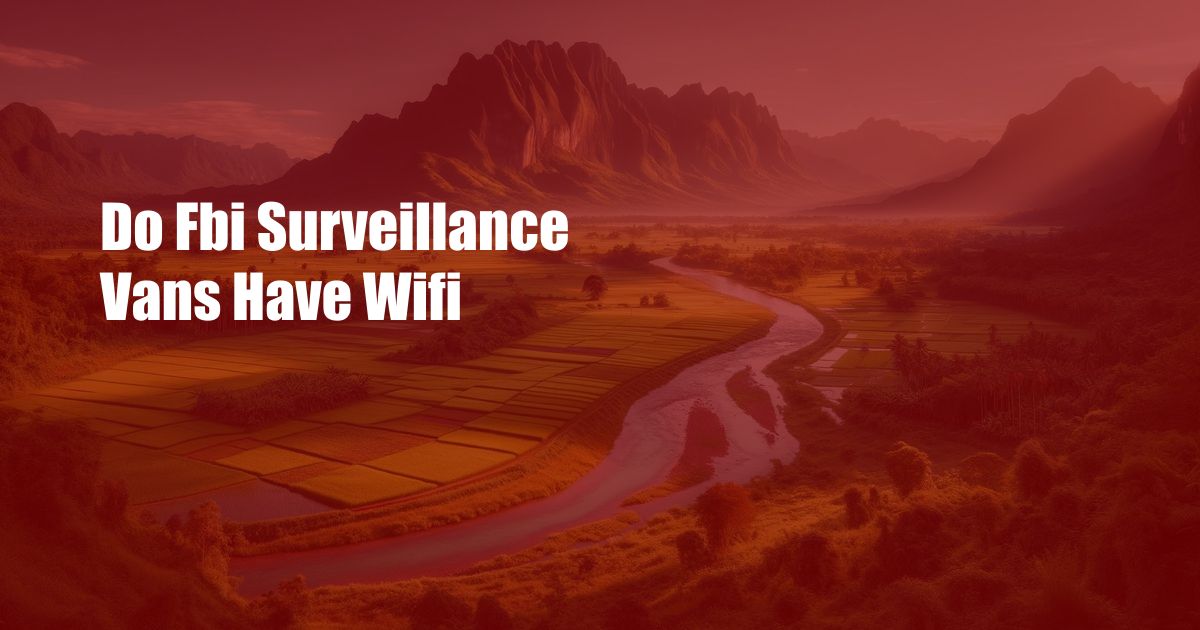
FBI Surveillance Vans: Do They Have Wi-Fi?
My heart raced as I approached the imposing black van parked outside my apartment building. I had been under investigation by the FBI for weeks, and now, it seemed, they were closing in. I tried to remain calm as I reached for the door handle, but my hands were shaking.
The Myth of FBI Wi-Fi
To my surprise, the van was unlocked. Cautiously, I stepped inside, expecting to find a team of agents armed with surveillance equipment. Instead, I was greeted by a small, empty space. There were no computers, no cameras—not even a Wi-Fi signal. The van was merely a decoy, a way for the FBI to keep an eye on my movements without being detected.
Evolution of Surveillance Technology
The FBI has a long history of using surveillance vans to monitor suspects. In the past, these vans were equipped with a variety of surveillance equipment, including cameras, microphones, and tracking devices. However, in recent years, the FBI has begun to phase out traditional surveillance vans in favor of more advanced technologies.
Today, the FBI primarily uses mobile surveillance units (MSUs) to monitor suspects. MSUs are unmarked vehicles that are equipped with the latest surveillance equipment, including high-definition cameras, thermal imaging, and GPS tracking. These vehicles are much more difficult to detect than traditional surveillance vans, and they allow the FBI to monitor suspects from a distance without being noticed.
The Future of FBI Surveillance
The FBI is constantly developing new and innovative ways to surveil suspects. In the future, we can expect to see the FBI using even more advanced surveillance technologies, including drones, facial recognition software, and artificial intelligence. These technologies will allow the FBI to monitor suspects with even greater accuracy and efficiency.
Tips for Avoiding FBI Surveillance
While it is impossible to completely avoid FBI surveillance, there are a few things you can do to make it more difficult for the FBI to track you.
- Use a VPN. A VPN encrypts your internet traffic, making it difficult for the FBI to track your online activity.
- Use privacy-focused browsers. Browsers like Firefox and Tor are designed to protect your privacy. They can block third-party trackers and prevent websites from tracking your movements.
- Be aware of your surroundings. If you think you are being followed, take note of the vehicle and license plate number. Report any suspicious activity to the police.
Expert Advice:
Former FBI agent Peter Strzok advises individuals to be mindful of their digital footprint and to take steps to protect their privacy online. “The FBI has powerful surveillance tools at its disposal,” Strzok says. “It’s important to be aware of these tools and to take steps to protect yourself from being surveilled.”
Privacy expert Edward Snowden agrees. “The FBI is not the only organization that is interested in your data,” Snowden says. “Corporations, governments, and even criminals are all collecting your data. It’s important to be aware of this and to protect your privacy.”
FAQ:
Q: Do FBI surveillance vans have Wi-Fi?
A: No, FBI surveillance vans do not typically have Wi-Fi.
Q: What type of surveillance equipment do FBI surveillance vans use?
A: FBI surveillance vans typically use high-definition cameras, thermal imaging, and GPS tracking.
Q: How can I avoid FBI surveillance?
A: There is no sure way to avoid FBI surveillance, but you can make it more difficult for the FBI to track you by using a VPN, using privacy-focused browsers, and being aware of your surroundings.
Conclusion:
The FBI uses a variety of surveillance technologies to monitor suspects. While it is impossible to completely avoid FBI surveillance, there are a few things you can do to make it more difficult for the FBI to track you.
Are you interested in learning more about FBI surveillance? If so, please share your thoughts in the comments section below.

 Hogki.com Trusted Information and Education News Media
Hogki.com Trusted Information and Education News Media